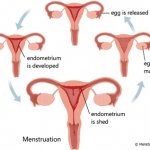How Long Does A Period Last
How long does a period last?
Females both young and old are often plagued by the question, “How long does a period last?” The answer to this will depend heavily upon the individual. For some women the menstrual cycle is light and will last for just three or four days. For others, however, the menstrual flow can be significantly more substantial and can take as many as seven days to run its course. The following are several additional things that every women should know about her monthly cycle and its normal length.
Staying Abreast Of Changes
It is usually a good idea for women to document their monthly schedules. This will help them to track both the length of their periods and to note any major changes that occur. When visiting with the gynecologist for regular exams, a woman will be able to refer to this chart when asked about her menstrual cycle. If diligent in this manner of record keeping, the individual female will be able to quite easily answer the question, “How long does a period last?” by simply referring to her monthly calendar and calculating the average number of days that her menstrual flow is present each month.
Knowing When You Ovulate
Keeping track of your period and its regular schedule is also important for learning which times of the month you will ovulate. Knowing your ovulation cycle is important when trying to conceive. Every woman will usually ovulate 14 to 17 days after the last day of her last period. This is the time during which the unfertilized egg travels through the fallopian tube and is made ready for fertilization. Those who are truly sensitive and in tune with their bodies can often feel this process. The greatest sense of physical awareness comes in the natural and very necessary increase in sexual desire as the hormones work to encourage procreation. There is also some physical discomfort that can be associated with this process, especially if the female suffers from ovarian cysts or other reproductive health issues.
How Long Does A Period Last When Other Health Issues Exist?
For some individuals a period can seem to stretch on without end. A period that extends beyond seven days could signify a reproductive health issue. Menstrual cycles that are regularly and excessively long are often the sign of an iron deficiency. This deficiency is called anemia and can make the individual feel very weak, tired and uncomfortable. Iron supplements that are taken on a regular basis will help to correct the anemia and will thus, shorten the period. Once a regular schedule of iron supplements is started most women can count on having normal and shorter menstrual cycles, less physical discomfort and higher levels of energy.
There is yet another reproductive condition that must be considered when answering the question, “How long does a period last?” This is called menorrhagia. This is a condition that can cause extended menstrual bleeding, even when a woman is in-between her normal cycle. Excess bleeding or spotting is more often than not a cause for concern and should always be discussed with a trusted physician.
There are many factors that can affect the average length of the menstrual cycle. Birth control, changes in sexual activity, reproductive infections and many other issues can cause menstrual cramps to become lesser or greater and the duration of the actual period to shorten or extend. Women who experience dramatic inconsistencies in their menstrual cycles should always consult with their regular physicians or a trusted gynecologist.






